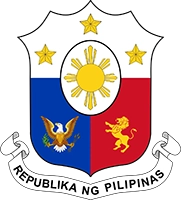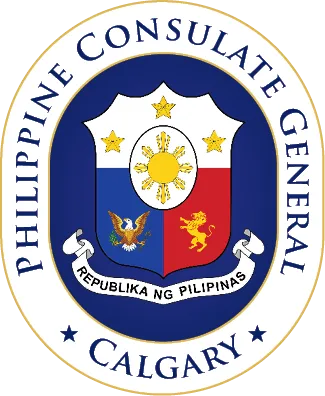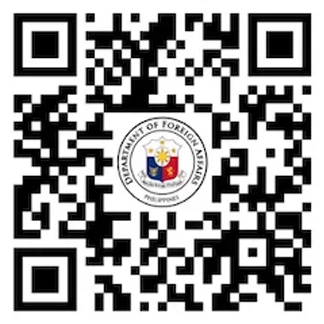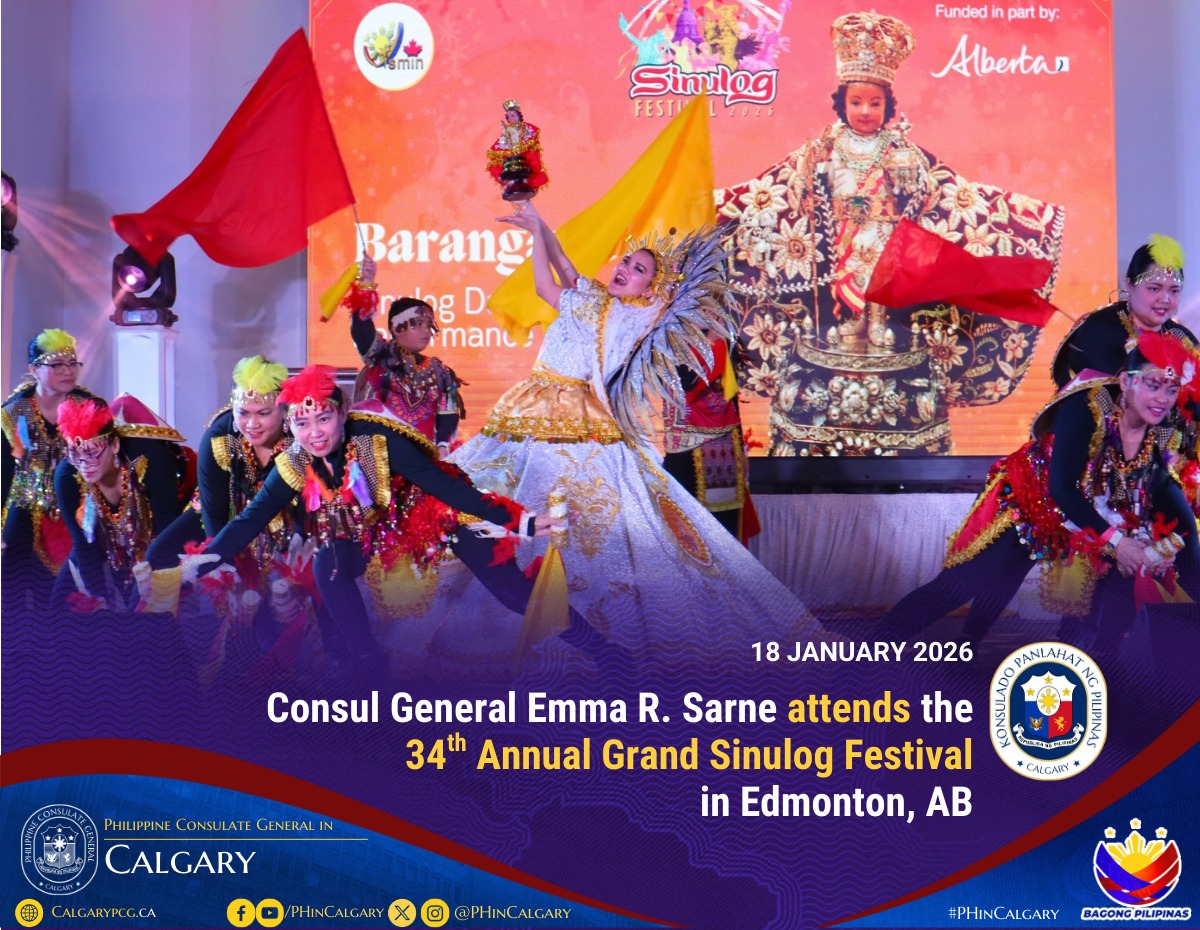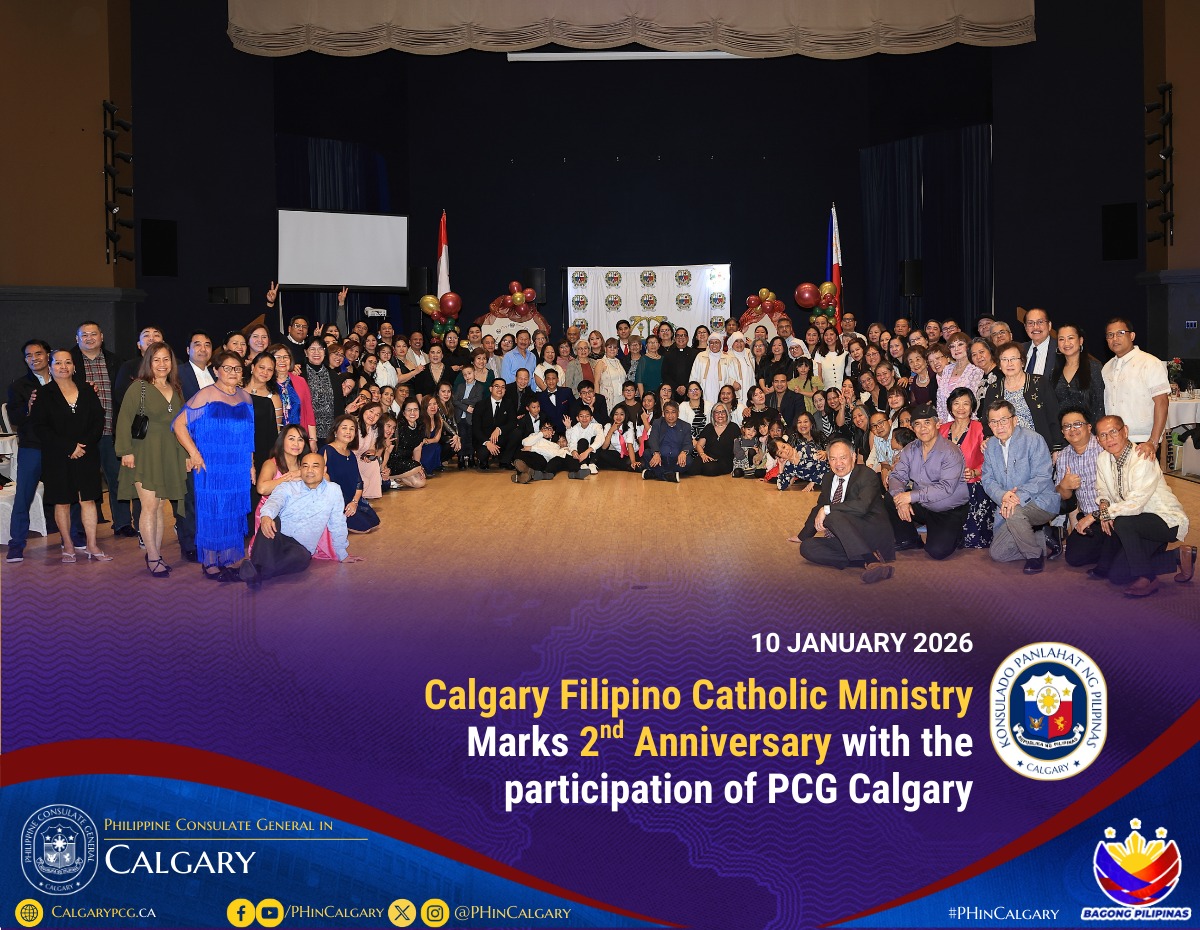Important Advisory:
Consular services are available by appointment only. Appointments are required for all consular services. Clients are required to secure an appointment through our online booking system (https://appointment.calgarypcg.ca) before availing of consular services. This ensures orderly processing and better service to all our clients. If you are unable to make your scheduled appointment, we would appreciate your consideration in cancelling it early, so that another client may be served.
I. Notarials and Legalization
The Philippine Consulate General in Calgary (PCG Calgary) can notarize (legalize) private documents executed in AB or SK to be used in the Philippines. This notarial service of PCG Calgary is the act of a Consular Officer witnessing someone sign a document. The document will be notarized in the form of an Acknowledgment or Jurat, as the case may be. For this service, personal appearance of the signatory/ies at the PCG Calgary and signing of the document/s in the presence of the Consular Officer are required.
Examples of private documents that may be notarized at the Consulate include Special Power of Attorney, General Power of Attorney, Deed of Donation, Contract to Sell, Deed of Absolute Sale, Extrajudicial Settlement of Estate, Affidavits, Bank Forms, and Insurance Forms, and others
Notarial services provided by the Consulate do not include the drafting or preparation of the document/s to be notarized. Applicant/s availing of this service are responsible for the preparation and printing of their own document/s. Sample affidavit forms or templates are, however, available on PCG Calgary’s website (see FORMS). Applicants are also responsible for photocopying their IDs and documents as the Consulate does not provide photocopying services.
As the Consular Officer performs the functions of a notary public, there is NO need to have the document notarized separately by a local notary public before submitting it to the Consulate for notarization.
The PCG does not authenticate documents that are executed or issued in other provinces of Canada aside from Alberta and Saskatchewan.
PROCEDURE
PLEASE READ :
For the information of our clients, the non-passport appointment system allocates 4 to 5 clients on an hourly basis with the same appointment time. For instance, If a client’s appointment is at 9:00 a.m., there will be 4 other clients with a 9:00 a.m. appointment.
On the day of the appointment, the Philippine Consulate General will issue queue numbers at the reception on a FIRST-COME FIRST-SERVED basis. We highly encourage clients to arrive at least 5 minutes (or earlier) before their appointment.
Clients are highly encouraged to strictly follow their appointment time and cancel any existing appointment if changes to the current appointment are to be made.
The PCG will only notarize documents that are signed in the presence of its consular officers. Thus, the personal appearance of the affiant/s/signatory/ies is required.
Below are the step-by-step procedures:
- Book an appointment for a notarial service at: https://appointment.calgarypcg.ca. Slots are opened on a monthly basis. Kindly create an account before booking.
- On the date and time of your appointment, please bring:
- the unsigned document/s to be notarized; the client will sign the document/s before the Consular Officer
- sets of original document/s to be notarized.
- original valid ID/s of the affiant/s/ signatory/ies and photocopy/ies of the valid ID/s per set of original documents. The names on the ID and the affiant/s/ signatory/ies to the document/s to be notarized should exactly match, for example, if your valid ID spells out your middle name, you must also spell out your middle name on the document to be notarized. If the name on your valid ID consists of First and Last names only, please write/type down your First and Last names only on the document/s to be notarized. Valid IDs include Philippine passport, Canadian passport, Canada Driver’s License, a Permanent Resident Card, Alberta ID, Saskatchewan ID. Other IDs and documents can be attached per client’s request.
- For regular processing: payment of CAD 38.75 in debit card or credit card for each original set of documents to be notarized. Document/s can be claimed at the Consulate after five (5) business days. A signed authorization letter, original receipt and original and photocopy of valid ID of representative are required if the claimant is not the owner of the document. If the client wishes that the document/s be mailed back to them instead, please provide a self-addressed, stamped unused envelope that PCG Calgary will use to mail the notarized document/s back. The client may also bring a self-addressed, prepaid, unused Xpresspost, Fedex, UPS or Purolator envelope with tracking features.
- For expedited processing: an additional fee of CAD 15.50 per document will be collected. The option for expedited processing is available for clients who submit their documents for notarization between the following times:
- 9:00am and 11:00am, Monday to Friday; the notarized document will be available for pick up between 3:00pm and 4:00pm on the SAME DAY it was submitted
- 1:00pm to 3:00pm, Monday to Friday; the notarized document will be available for pick up between 10:00am and 11:00am on the FOLLOWING DAY from its submission. The option for expedited processing is subject to the number of documents to be notarized and the availability of Calgary PCG personnel.
NOTE: For the legalization of a Special Power of Attorney, the Principal and two witnesses must sign in the presence of the consular officer. You can either bring your witnesses when you apply or sign with witnesses at the consulate. Consular staff cannot serve as witnesses for your documents.
Though the red ribbon is not normally utilized anymore in the notarization/legalization of documents submitted at PCG, voluminous documents such as contracts, court documents and others are securely bonded by a red ribbon, eyelet and gold seal to prevent detachment.
Processing of the document/s takes five (5) business days before these are returned (and if by mail) to the affiant/s/signatory/ies, provided the requirements and procedures listed above have been complied with. The processing period excludes mail delivery time.
For notarized document/s to be mailed back to the client, PCG Calgary is NOT RESPONSIBLE for any delay or loss in the mail due to fortuitous events or other uncontrollable circumstances. It would be best to use an envelope with tracking features so the affiant/s/signatory/ies would know the status of the delivery of the document/s by Canada Post/private courier service.
II. Apostille
IMPORTANT, PLEASE READ/ BASAHING MABUTI:
IMPORTANT, PLEASE READ: The Philippine Consulate General in Calgary (PCG) does not issue Apostille Certificates. In Alberta, the Apostille Certificate is issued by the Ministry of Justice of Alberta through its Official Documents and Appointments Office in Edmonton (https://www.alberta.ca/document-authentication-other-jurisdictions-countries), and in Saskatchewan, by the Ministry of Justice and Attorney General of Saskatchewan via its Authentication Services Office (https://www.saskatchewan.ca/government/notarized-documents-legislation-maps/authenticating-notarized-documents). These agencies issue and affix the Apostille Certificate to public documents issued in their respective provinces, or to documents notarized by a notary public in Alberta or Saskatchewan. Once a document bears an Apostille Certificate, it is automatically accorded legal effect in the Philippines and DOES NOT REQUIRE AUTHENTICATION by the PCG. Please click on the links provided on the procedures for securing an Apostille Certificate for public documents issued in either Alberta or Saskatchewan.
BASAHING MABUTI: Ang Konsuladong Panlahat ng Pilipinas sa Calgary (PCG) ay hindi nag-iisyu ng Apostille Certificate. Sa probinsya ng Alberta, ang Apostille Certificate ay iniisyu ng Ministry of Justice of Alberta sa pamamagitan ng Official Documents and Appointments Office sa Edmonton (https://www.alberta.ca/document-authentication-other-jurisdictions-countries), at sa Saskatchewan naman, ito ay iniisyu ng Ministry of Justice at Attorney General ng Saskatchewan sa pamamagitan ng Authentication Services Office
(https://www.saskatchewan.ca/government/notarized-documents-legislation-maps/authenticating-notarized-documents). Ang mga ahensiyang ito ang nag-iisyu at naglalagay ng Apostille Certificate sa mga pampublikong dokumento na inisyu sa kanilang nasasakupan, o sa mga dokumentong pinanotaryo sa isang notaryo-publiko sa Alberta o sa Saskatchewan. Kapag ang isang dokumento ay may Apostille Certificate na, ito ay awtomatikong kinikilala at may legal na bisa sa Pilipinas at hindi na kinakailangang ipa-authenticate o ipasuri sa PCG. Kung maaari lamang pong basahin ang mga panuntunan sa pagkuha ng Apostille Certificate sa mga naka-indikang links sa websites ng mga ahensiyang ito.
For public documents signed or issued in Canada to be accorded legal effect in the Philippines, these documents must be covered with an Apostille certificate. An Apostille certificate is issued by competent authorities in Canada and certifies the authenticity of a public document for use in the Philippines.
Examples of public documents issued in Canada are: Birth Certificates, Marriage Certificates, academic credentials, and export and corporate records and others.
Only a Notary Public (and not a Commissioner for Oaths) can notarize private documents to be submitted to Alberta and Saskatchewan Competent Authorities, who will then affix the Apostille Certificate.
For the competent authorities that can issue Apostille certificates for public documents issued in the province of Alberta, please refer to this website: https://www.alberta.ca/document-authentication-other-jurisdictions-countries
For the competent authorities that can issue Apostille certificates for public documents issued in the province of Saskatchewan, please refer to this website: https://www.saskatchewan.ca/government/notarized-documents-legislation-maps/authenticating-notarized-documents
Note: The Philippines and Canada are now officially parties to the Apostille Convention. Starting 11 January 2024, public documents with an Apostille certificate issued by Competent Authorities in Canada (specifically the two Provinces of Alberta and Saskatchewan) will no longer require the authentication of the Philippine Consulate General in Calgary for use in the Philippines.
The PCG Calgary will continue to issue certificates of authentication to public documents authenticated in Alberta and Saskatchewan before 11 January 2024.
